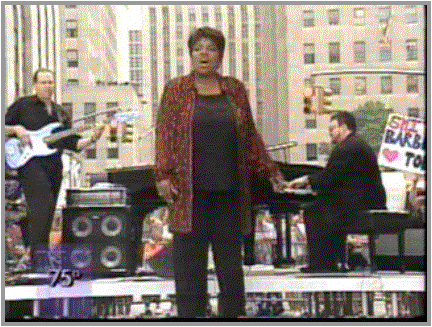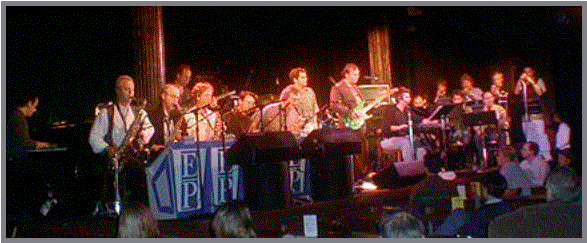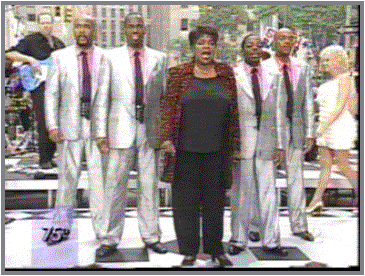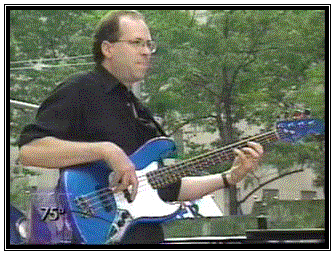Global Bass Online November 2000

|
Global Bass Online November 2000
|
|
Check out the GiveAway from BASSIX Studio
|
|
|
I |
f
you are in the business as a ‘free agent’, it’s wise to have a
calling card and a promotional package. In this day and age, one of the smarter
moves we’ve seen in a while was the simple but powerful package that said it
all from Paul Adamy. Everything we needed was on one CD-ROM.
Included were two live performances, one with the Paul
Winter Consort on Live with
“CBS This Morning” and the second one was for the United Cerebral Palsy
Telethon featuring Larry Hoppen & Friends singing “You’re Still the
One”.
Also contained on the CD were 35 short sections, audio
vignettes with various artists Paul has worked with in all genres of popular
music. The liner notes contained a lot of information not only about the songs
themselves but also a list of television shows, film scores he has worked on,
his Broadway experiences and jingles for radio.
The list reads like a who’s-who
in adult contemporary music, with artists from Carly Simon to Gladys Knight,
Phoebe Snow to Pam Tillis, Lou Rawls, Ben E. King, Rich Derringer, Joe Lynn
Turner, little Anthony and the Imperials, Dave Weckl, Leslie Gore, Mike Stern,
Randy Brecker, Jan Hammer, Cab Calloway, Gloria Gaynor, Rick Springfield, the
list just goes on and on.
 |
Our man Paul on the Today Show (NBC) with Gloria Gaynor
His film credits include music for that excellent
thriller from a few years back, ‘Tremors’ with Kevin Bacon. Paul’s
Broadway experience includes ‘Saturday Night Fever’, ‘Footloose’,
‘Jesus Christ Superstar’ and others, including his most recent venture,
‘Smokey Joe’s Café’.
His radio work includes, Pepsi, Miller Lite, Kraft, HBO
Mountain Dew, Pizza Hut, Coca-Cola, Budweiser, Diet Coke with the cast of
“Friends”, K-Mart, Weight Watchers and many others.
Television work includes working for various artists on
“This Morning”, “The Today Show”, “The Rosie O’Donnell Show,
“People’s Court”, “Jenny Jones”, “The Cosby Show”, “EXTRA”,
Cosby spin-off “A Different World”, “Good Morning America”, “ABC Wide
World of Sports”, “Reading Rainbow” and this incredible list also goes on
and on.
Looking at this ever expanding trail of work, two things
are obvious…the man knows how to get a gig, keep it and parlay it into more
work. The second point…why are you
all sitting on your butts, reading this and whining while Paul Adamy gets all
the work and all the choice gigs?
Part of the answer lies in the aforementioned CD-ROM.
Some pretty smooth and fine playing here, on fretted, fretless and stand up
bass. But the fact remains, there are many fine players out there and
truthfully, a lot of them are reading this right now.
The promo pack says it very well. A great way of getting
a gig. Just send the package to the people that make the decisions and let it do
its stuff. On top of that, however, there is something else, something we at
Global Bass hear mentioned time and time again when talking to successful studio
musicians and successful live performance bassists too.
Social Skills. How do you get along with the people you
work with? If you’re known as a drunken sot, a high maintenance pain in the
butt…If alcohol is a minor religion to you, if you are married to drugs…If
you argue, don’t have your equipment together, whine and complain to the
producer or argue with the artist that has hired you, you won’t be asked back.
Simple.
These are things that Paul Adamy has figured out. Long
ago. That is why his list of accomplishments keep growing and growing.
Oh and one more thing the CD-ROM got Paul: our interest.
So we thought we could take a few moments of his time and ask him a bit about
some of his more memorable experiences and also a bit more about his successful
Job Search Program~~his CD-ROM. We thought it might help some of our readers,
those that feel stuck in garbage day jobs or in a dead end bar band.
There is an old adage that still rings true, “If you
want to be successful, study successful people, and do what they do”.
![]()
Global Bass: One of the things that struck us from your CD is the very diverse list of artists covering such a wide range of music. You would never be bored!
Paul
Adamy:
No, it really keeps it interesting. I am very
fortunate to have so many connections, but that’s the great thing about the
New York area too. I think that if I were in any other place than New York or
L.A., it might be much more limiting.
GB: You presently are working quite a lot with the Ed Palermo Big Band, does it also include touring?
Paul:
We’ve done a couple things out of town but for
the most part we have a regular ongoing gig at The Bottom Line, which is a great
club in Greenwich Village. That’s kinda like our home base. We play there
about 10 times a year. It’s a great band and it’s a great opportunity to
play some of Frank Zappa’s music. That is what the group does, although we are
starting to branch out a bit. Eddie is a good composer in his own right.

Paul
with the Ed Palermo Big Band at the Bottom Line
GB: Why did you choose to move into featuring Frank Zappa’s work? Was this a group choice?
Paul:
It was basically Eddie. He’s had the band for a
number of years. They used to have a Monday night slot at Seventh Avenue South,
which is the Brecker Brothers club in Manhattan. So he has been around town for
about 20 years and he has always had a diverse book which included a couple
Zappa, Edgar Winter, Emerson, Lake and Palmer, Jimmy Hendrix and his own stuff.
The Zappa stuff caught his eye and when Frank died a few years back, Eddie decided to put together a whole set of Frank’s music. We performed it at The Bitter End, which is another club in Manhattan. It got such great response that The Bottom Line said “Why don’t you come over here and do it?”. They started promoting it regularly and started adding some guest artists. We had Ike Willis, Mike Keneally and Dave Samuels who have all played with Frank over the years come and be guest artists with us.
Mike
Keneally is a great guitarist based on the West Coast but whenever he is out
here on a tour, we’ll co-ordinate it so he can play with us as well. He was in
Frank’s band for the last couple tours. Really great guitarist, he took Steve
Vai’s place. He was on ‘The Best Band You’ve Never Heard’ and some other
great stuff along with Ike Willis. It was great to have Ike too, they both sing,
they both play great guitar.
GB:
With the Zappa material, you are doing it predominantly instrumental?
Paul:
It’s only about 20% vocal stuff. We keep trying
to stress the instrumental and the compositional aspects of Frank’s music.
GB:
Which is an interesting position to take with Zappa’s music, as a lot
of the humor and his wittiness came out in the lyrics, and a lot of his fans saw
Frank’s strengths from that position.
When you are working with the songs, are you allowed to
express yourself as a bass player beyond the written parts in the original
versions of the Zappa material?
Paul:
Well, Eddie being the arranger, he has a pretty
clear idea of what can be done to add my own style and touch. Because there’s
18 pieces in the band, he has to be careful. We all have to be careful, with so
much going on, careful that it all stacks up so we can coast through all these
arrangements and orchestrations. If the music is not available, he has to
transcribe it and arrange it for our instrumentation.
GB:
It would be total chaos otherwise.
Paul:
Exactly, but there is still definitely room to
stretch out. We did release a complete CD of this music. It’s called The Ed
Palermo Band Plays the Music of Frank Zappa”.
GB:
Now the band is also working on some Edgar Winter tunes as well?
Paul:
Yeah, we’ve kinda expanded. Ed is also a big fan
of the music of Edgar Winter. His very first album, called ‘Entrance’, which
came out in the mid-70’s was such a phenomenal record. Edgar is such a great
composer, singer, sax player, keyboard player. We had another club interested in
that. The Bottom Line was just interested in the Zappa stuff. It all started to
pick up some steam. Will Lee (of the Letterman Show) heard about it, came and
saw us and actually ended up singing with us.
Our
record is one of those records that a lot of musicians have heard about. When
Eddie did his first record a few years ago, he actually had Edgar on it and also
David Sanborn. Will Lee brought Paul Schaffer down to check it out.
GB:
Did you get much of a chance to talk to Will Lee at all?
Paul:
Oh yeah, he’s a lot of fun and he’s such an influence
and a major hero.
GB: Was it a buzz playing with a hero?
Paul:
At that time he wasn’t a legend yet. I grew up
playing with Dave Weckl but at the time he also wasn’t a legend. It’s kinda
like playing with Steve Gadd today. Will is such a big name around town. So it
was fun and he was such a nice guy to hang out with. We traded a lot of ‘bass
talk.’
GB: Does the demo CD open a lot of doors for you?”
Paul:
Yeah, it really does. In the past, like anyone
else, I put together a tape reel. When I got a CD burner a couple years ago, I
realized that it was much better. The CD allows people to get to the tunes they
want to. If you use a tape, if you
can the people to play it, they only play it for the first couple minutes. But
with the CD, you can jump ahead. I though, ‘it’s a CD, people can jump
around from cut to cut, style to style if they want to.’
They can listen to the whole thing or two songs, or whatever.
(Editors Note: After the 10th of November, we will include a few tracks from the Adamy CD-ROM so you get an idea of both the styles of music, but also Paul’s expertise. So be sure to check back, the man’s a killer smooth bassist.) Also with the video capability this was also a great opportunity to put this CD Demo out now. It’s like a business card.
GB: Yeah, a giant business
card, with many pages of information. A great marketing idea.
So how did you start out as a musician, the garage band route and all the
rest?
Paul:
I started out on saxophone and played that until the 9th grade. I
stopped because I just didn’t like it anymore. It no longer felt like my
instrument. I picked up the bass in 10th grade. A friend of mine
played guitar, the typical thing.
GB:
The garage band route?
Paul:
Yeah I did that for a while. I missed playing an
instrument. I picked up the bass and started playing in a band a month or two
later. Then I studied with a local guitar player that got me into reading right
away. I’m happy he did because it’s come in handy. It helped me with all the
aspects of the work I do now.
GB: Are you a good enough reader at this point that you can pretty well just walk in and play from a chart right away?
Paul:
Yeah, absolutely.
GB:
This is completely necessary to have as a working tool if you want to do
jingles and movie scores. The ad people don’t want you to be learning the song
on their dollar.
Paul:
Actually, some of the hardest stuff is when we
rehearse with the Palermo Band. Eddie passes out the music and it’s not like
“Well let me take this home and let me practice it for a week”. He hands it
out, counts it off and everybody goes!
Of
course, all the horn players are usually the best readers in the band. But
you’ve just got to jump into it. I’ve been at it long enough that I think I
can feel confident to work from the charts now.
GB: It takes a bit of guts still, doesn’t it?
Paul:
Yeah it does! I know a lot of people that
wouldn’t want to do it. Now when I see new people, especially drummers, when
they come into the band if our regular drummer can’t make it, you see them
struggle with some of it.
GB: Are you able to keep your regular drummer fairly often? It’s a bit of a drag when you have to work out your shots and changes with a new drummer all the time.
Paul:
Oh yeah, it’s just once in a while.
I find it’s especially tricky, even if the drummer is great and he
plays with great time, if he puts the beat somewhere other than the usual spot.
I call it ‘playing in the cracks’, it’s just a comfort level when you are
playing the same things together. If you are used to playing it at 85 beats per
minute and the new guy plays it at 89. It’s so close but there’s a comfort
level that changes.
GB: At what point in your life did you decide that the life of a musician was what you wanted?
Paul:
GB:
Have you ever been tempted to take on the 5 or 6 string bass?
Paul:
Up until this year, I have only played the 4
string. I play a Kubicki Factor on the CD and it has the extension. There are
some low notes on there but this year I actually got a 5 string and made the
switch. It’s a little strange going back to the 4 now. I’ve been playing the
Sadowsky 5 string since March. Bass to me has always been the low notes and a
good foundation. A good supportive role. I certainly admire guys like John
Patittuci, Victor Wooten. Guys that can play all that, but they have their own
bands, so hey!
GB:
Would you ever be motivated at some point in your career to follow the
path of someone like a Victor or John?
Paul:
I might be, I might. Right now I am working so much
in so many fields, that I am not bored. It’s so interesting, exciting.
Basically one of the reasons I went to 5 string because I have been
‘subbing’ down at Saturday Night Fever, one of the Broadway shows here.
Believe it or not that’s written for the 5 string! This from a book of `70’s
Disco! So if figured if I wanted to ‘sub’ on the show, this was a good time
to shake things up and get the 5 string.
GB:
When you made the move did you find you had to change your amplification
at all. More power or a larger woofer?
Paul:
No I didn’t, I’ve used Eden equipment for a
while and I have a great EBS head and it really was able to handle the low end.
Once thing I did use more with the 5 string is that I stuck my DBX Compressor
back in the rack. Just to tighten up the low end, that’s all. That’s really
the only change I had to make. The Sadowsky has a pretty high output too with
the active electronics. I wanted to control that a little bit more.
GB: I was looking at your
equipment list here. 600 watts for the EBS head, that’s a lot of power.
Paul:
That is a lot of power, it’s just a great head
too. I found it a couple of years ago. I had been using all Eden equipment
before that. I just get such a warm sound with the EBS though. I still use the
Eden cabinets, for me I think they are the best cabinets.
GB: On your demo CD you have a song called ‘Pound for a Brown”, what effect are you using on the solo?
Paul:
That’s actually the auto-wah. It’s a Boss pedal
and kinda like an envelope filter on it. It has a great ‘wah’ sound that you
get, it’s very touch sensitive. It’s a lot of fun, I used that pedal quite a
bit.
GB: With all you are doing, studio work, film scores, house gigs, concerts, ‘subbing’ in, Broadway shows, don’t tell me actually find time to include teaching?
Paul:
Oh yeah, I am actually an instructor or at the Music
Conservatory at Westchester in the county across the river from where I am.
It’s a school I’ve been teaching bass at for about 10 years now. I just have
about 5 students now. It’s one afternoon a week and that I can handle.
GB:
You are on busy guy and all of it has to do with music. That is cool and
very rare.
Paul:
Yes, I have been ‘subbing’ on Broadway for about 2
years now in about 6 different shows and that’s a nice way to augment my
schedule too. For years I kinda shied away from Broadway because I thought “8
shows a week, with a matinee”, that was boring.
About 2 years ago a friend of mine asked me to come in and play ‘Smokey Joe’s Café’. That has been running on Broadway for a number of years. It turned out to be a lot of fun, for one thing, there was no orchestra pit, we were sitting on stage. It’s a great band, great tunes. It got me hooked.
 |
From
there to ‘Footloose’ and now I am subbing for ‘Saturday Night Fever’.
I’m down there quite a bit. Chris Parker is the drummer and he has
played on more gold albums than anybody. It’s just a great scene there, with
great musicians.
GB:
What do you feel is in your thinking that keeps you true to the craft,
that doesn’t allow you to get waylaid into factory or office work, nice, safe
jobs in general. Are you aware of any conscious decision to not follow that
path?
Paul:
I think that if the gigs that you are doing are
interesting enough then that’s a great motivation to keep going.
GB:
Looking at your musical resume, I can see that you were never bored. You’ve also managed to get all this work around where
you live without having to join a travelling band and leave your family behind.
Paul:
It’s been very nice to see my kids grow up and
I’ve still been able to make a living in New York, and not have to go on the
road.
I
have had lots of friends that play with Bon Jovi, Billy Joel, Ringo Starr and
The Doobie Brothers. They will go off and do their tour only to come back and
then have to get in line to get gigs just like everybody else. I can’t believe
I get to stay around here and make a good living and see my kids grow up. It’s
pretty nice. I think that the path I picked out is actually better than what I
originally thought it would be.
GB: Have you been pursuing any compositional goals?
Paul:
I’ve written some things in the past, but I get
so much enjoyment working so much as a bass player and I find it fulfilling to
just create your own bass parts.
GB:
With Ed’s band, does he give you some latitude there as long as you are
willing to work as a team worker?
Paul:
Yes, it’s my responsibility to be aware if the
parts are doubled with the bass trombone or the baritone sax. You’ll know
where you have to stay true to the music. I have to know where and when those
times are. Other than that, I have a lot of freedom.
GB: You’re doing quite a bit of studio work as well.
Paul:
I did a record last week for a new artist on RCA.
Now I don’t even know when that is coming out. I do lots of sessions like
that.
GB:
So you’ll get a call in to do a session and the artist, the actual
person the music is for, might not ever be there. You don’t even necessarily
know who the artist is half the time, and suddenly you find yourself on
somebody’s record.
Paul:
GB:
Cosby’s bass player for 4 years. Did you do all the music?
Paul:
I did the theme and the weekly cues, it was nice
weekly gig.
GB:
You were involved with Woodstock?
Paul:
It was the Woodstock that actually took place on
Max Yasgars farm, the original farm. It actually was about 2 years ago and I was
there with Larry Hoppen and his band. Larry was the singer and the voice behind
the band ‘Orleans’ and their hit “You’re Still the One” and “Come
Dance With Me.” That was also on
the CD-ROM.
GB: Are you involved with endorsements at this point?
Paul:
I have a deal with EBS but not with Eden. At
this point I am not a world famous name so it’s not likely they are gonna use
me in any ads anyway. I just want to use gear that I like. That is what is most
important to me. You see some of these other artists and you wonder why they are
using some of that gear.
GB: Yeah, I’ve wonder that too. You look at some the stuff and you think, “What is wrong with you?” Some of this stuff has the sound of a half-strangled goat.
Paul:
You can’t tell me the guy’s composing with this! Or
even recording with it!
GB:
We’ll finish this off by saying: You’ve played with some of the
bigger names in contemporary music today, lots of interesting people, lots of
interesting music. Do you see yourself doing this for the rest of your life?
Paul: You now, I think, by getting back to what I was mentioning before, I really think I am happy with my place in the music world. As long as I am respected and I can play some great music, that works for me.
 |
lownotes@spyral.net
|
Send mail to
Copyright © 2000-2009 Global Bass Online
|